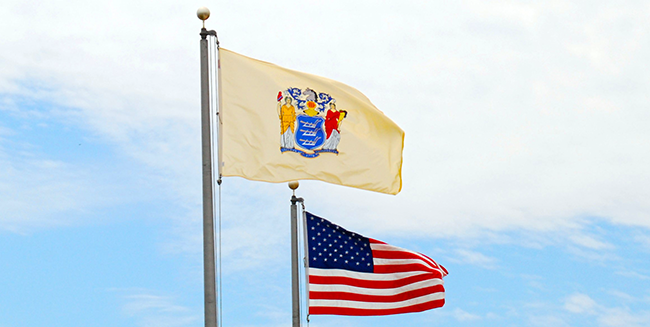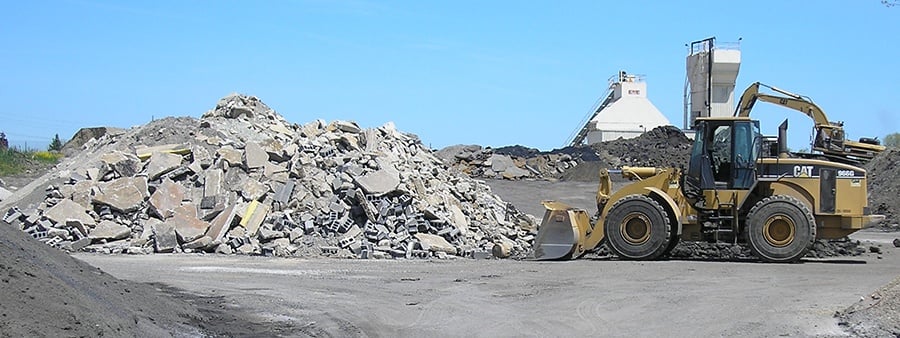We explain how environmental regulations in New Jersey relate to environmental regulations in other states.
Working all over the United States, we've dealt with our fair share of companies struggling to make heads or tails of the environmental regulations that impact their operation. This goes double for New Jersey.
If you've spent any time in the Garden State running or operating a business, you know we have a lot of regulations (and taxes) to deal with. But how does this compare to other locations? How are the environmental regulations in New Jersey compared to Pennsylvania, Delaware, or New York?

Are environmental regulations the same in New Jersey as other states?
Business owners across New Jersey, especially those near the borders thinking of moving shop, tend to ask us things like “do all states have the same regulations?"
The short answer is this: No.
The environmental regulations in New Jersey are not the same as other states, and often go beyond those required by the Federal government.
The long answer is this: Sort of.
How can this be? Well in order to understand how environmental regulations in New Jersey work, let's take a short civics lesson.
Environmental regulations usually start at the federal level.
Environmental regulations in the United States by and large arise from federal legislation, passed by Congress (your elected representatives) and signed into law by the President.
Think of things like the Clean Water Act, Clean Air Act, and basically every other major environmental law that businesses and others live under.
After passed into law, the appropriate department or agency is remanded to write implementing regulations. In other words, that have to make that new law into something that the regulated community can do.
So the USEPA, for example, doesn’t actually create the environmental law, they just create the implementing regulations on what must be done to comply with the law.
Environmental regulations trickle down to the state level.
This is where it gets a little confusing.
Virtually every environmental regulation I am aware of arising on the federal level gives individual states the ability to administer the newly-enacted federal law, if they so choose, all or in part.
So for example, an individual state can pick and choose which portions of the Federal Clean Water Act they would elect to administer, with the blessing, approval and continued oversight of the Federal USEPA. This process is called “delegation”. Think about it. In New Jersey we have NJPDES Stormwater Permits, which are a type of NPDES Stormwater Permit specifically for New Jersey.
Most states in the U.S. have elected to administer most portions of most federal environmental regulations, meaning that theoretically all states have more or less the same regulations.
For example, the Federal Clean Water Act requires stormwater permits issued under NPDES regulations, so most states administer a program that issues and enforces NPDES permits under their own delegated state regulations.
This is why above I said sort of. Each state is going to have some sort of stormwater permit you'll need to adhere to. However, since each state decides how to implement the permit, the permit is going to vary from state to state.
Many states have in their state constitution, or similar document, the mandate that the state’s regulations will not exceed the scope of the Federal regulations. Meaning, states usually won't make up their own rules which go above and beyond federal regulations. However, there’s a handful of states which seem to revel in their ability to exceed the scope of the Federal regulations.

New Jersey environmental regulations are far reaching.
Think New Jersey is one of those states I just mentioned? Well, you're right, it is. Yes, that’s right, New Jersey as a state has no restriction on exceeding the scope of Federal regulations, let alone coming up with their own environmental regulations. Again like I said, we sort of have the same regulations as other states. But, think of the federally-mandated environmental regulations that every other state has as our baseline. The NJDEP can – and frequently does – exceed the scope of the Federal regulations via their own regulations.
For example, the Federal Clean Water (presently) does not directly regulate “discharges to groundwater” since groundwaters are not within the scope of “waters of the U.S.”. However, New Jersey includes groundwaters within their definition of “waters of the State of NJ”, so discharges to pits, ponds, or settling basins are regulated the same as a direct discharge to the Delaware River or Barnegat Bay. For good or bad, that’s the way it is here in New Jersey.
Another example is the fees charged. The Federal regulations are silent on the fees required to administer these environmental programs, allowing each delegated state to set their own fee structure. As you can imagine the fees in New Jersey for environmental regulatory compliance are among the highest in the United States.
Environmental Regulations in New Jersey vs Other States
So the answer from above: are environmental regulations in New Jersey the same as other states? No.
But they kind of are. States are all going to have similar permits, but most environmental regulations New Jersey businesses have to deal with are specifically for New Jersey.
Let's take a step back though. Think about it, not all of this is completely unreasonable. After all, New Jersey is the most densely populated state in the U.S. We have a long history of industrial usage and widespread contamination, with a large number of contaminated sites such as Superfund sites. Plus, we're located in a fairly precarious location. Surrounded by water on 3 sides, bordered by two major cities, home to a federally protected natural forest... Let's face it, in New Jersey there are precious natural resources which require strict protection. We all love our beaches and spending time in the woods in the Pinelands, or fishing on some of our beautiful rivers and lakes.
So maybe we do need more environmental regulation than a place like Wyoming with a lot less industry and population pressure. And maybe the fees, when all is considered, are justified given the need for governmental oversight of environmental protection in the Garden State. Those are not easy questions to answer and there is plenty of room to debate both sides of the coin.
But one thing is clear. New Jersey does have a lot of environmental regulations to deal with – seemingly more than most other states, and they’re not simple, clear or easy to deal with for many. And, they certainly aren’t cheap.
To learn more about environmental regulations in New Jersey, click here to contact us or give us a call at 609-693-8301.


